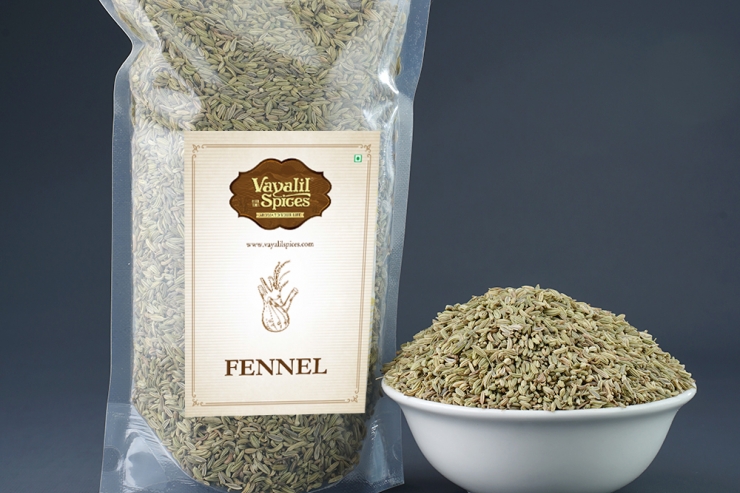 Please wait...
Please wait...

Fennel(Foeniculum vulgare)
General Information
A crop of Southern Europe, fennel is now cultivated for export in countries like India, Germany, Italy, France and Russia. Ancients used fennel as a condiment and culinary spice. The Greek considered it a symbol of success. To the Romans, the young fennel shoots were a vegetable food. Fennel is the dried fruit of a perennial, aromatic, herbaceous plant that grows to a height of 1 to 1.5 metres. plant has finely divided green leaves and small, yellow flowers.
The fruits are oval, 6-7 mm long, rigid, greenish and aromatic. It is harvested before the fruits are fully ripe. The plants are threshed after drying to obtain the fruits.
Propagation is usually by seeds and some times by root or crown division.
Flavour characteristics
Fennel has an agreeable, sweet aroma resembling aniseed
Usage Profile
Indian fennel, also known as 'Saunf', is used in food, medicines, liquors and perfumery. The Italians cook fennel with roast pork. In India fennel seeds are used in vegetarian cooking, pans and also chewed as a digestive aid. In Europe it is a traditional seasoning for fish, flavouring pickles, cucumbers etc.
In the medical field, fennel seeds were used for treating wheezing, to boost mothers' milk and promote menstruation.
It is believed that fennel helps to cure stomach complaints. In ldian and China, fennel has long been taken as remedy for scorpion and snakebites.
Geographical conditions
Fennel grows well in areas with cold climate conditions. In India fennel grows in well-drained loams of Gujarat and Rajasthan.
Producing Regions
in India, Guajrat alone contributes a major share of the total produce of fennel, the rest being complemented by Rajasthan.
(The major producing districts in Gujarat are Sabarkantha, Kaira, Mehsana, Ahemadabad and Sirohi and Jodhpur in Rajasthan)
Grades
Available as seeds, powder and volatile oil.
Exports
Fennel is mainly exported to the USA, Singapore, the UK, UAE, Srilanka, Malaysia, Saudi Arabia and Japan in a variety of forms which include seeds, powder and volatile oils.
Harvesting Season: February to April
Marketing Season : April to June
Send enquiry for this product, we will contact to you as soon as possible.
For the purchase of every 500 grams [in total] an amount of Rs 50.00/- will be charged as Handling and Delivery charges. Your order will be processed and delivered within 7 work days from the date the order has been placed.
At Vayalil Spices, your satisfaction is important to us, and our goal is to deliver a great product and fantastic customer service. If for any reason you're unsatisfied, let us know, and we'll work with you to make it right.
We take great pride in offering a safe and secure online shopping experience. We guarantee that every transaction you make at vayalilspices.com will be safe. You will pay nothing if unauthorized charges are made to your card as a result of shopping at www.vayalilspices.com